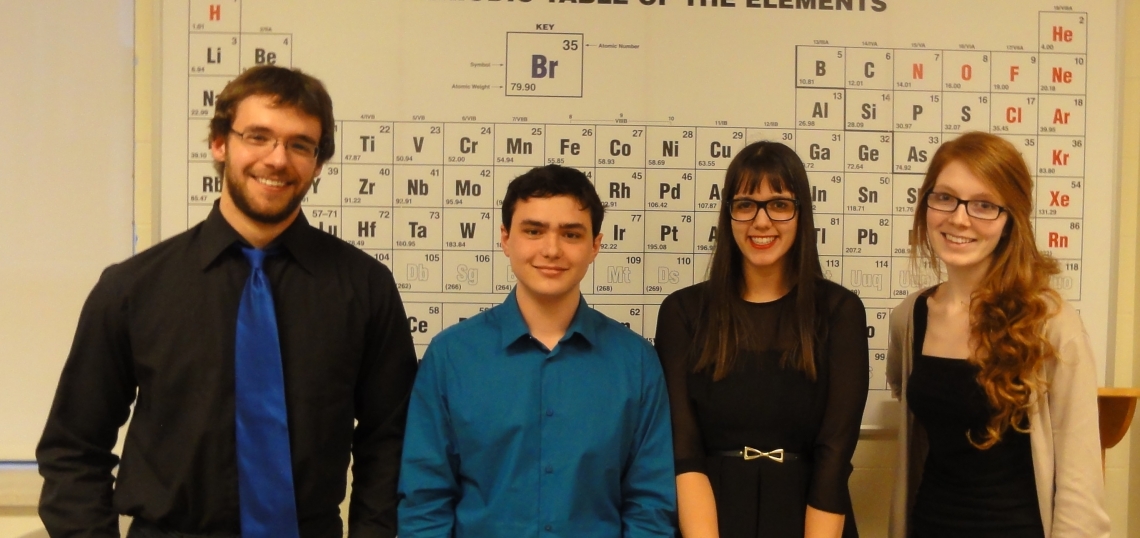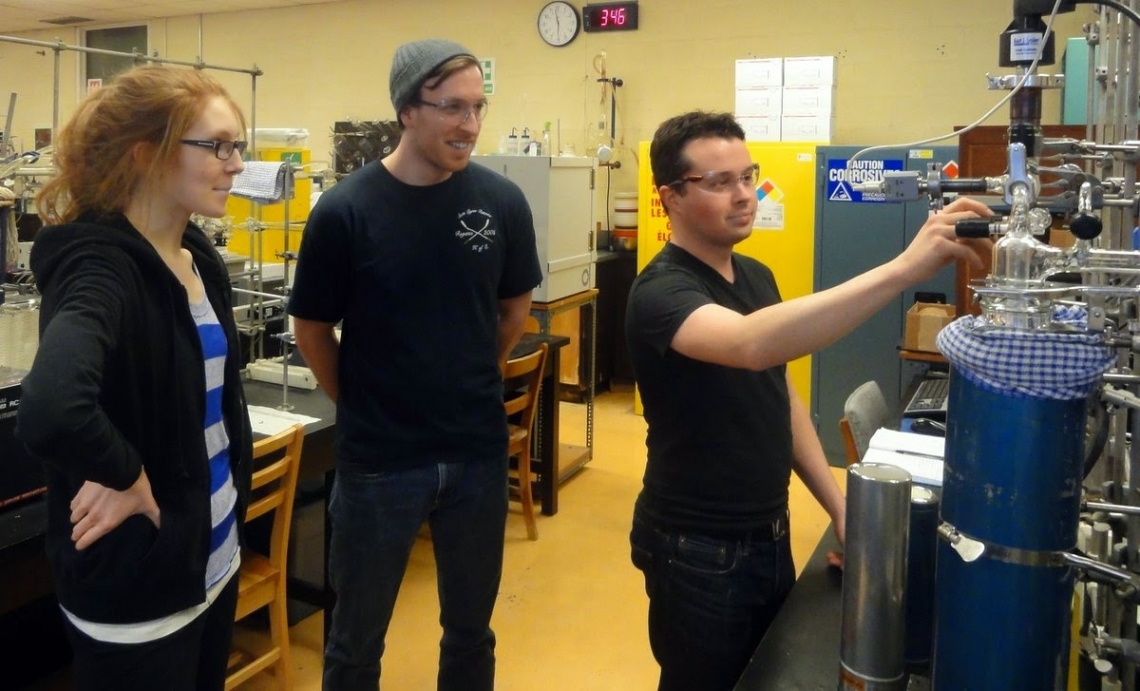Future Undergraduate Students
Our department has a strong and vibrant undergraduate program in chemistry. Besides our Honours and Major Degrees, we offer a Major and Honours B.Sc. in Computational Chemistry and biology-focused stream through a Major and Honours B.Sc. Chemistry (biological). We also offer Joint Honours Degrees with Applied Mathematics, Biochemistry, Earth Sciences, and Physics. Each year approximately 20 students graduate with B.Sc. degrees in chemistry, which are accredited by the Canadian Society for Chemistry, along with another 15 minors in Chemistry. All of our students have opportunities to conduct research and assist in teaching during their undergraduate degrees.
Why Study Chemistry at Memorial?
Chemistry is a fascinating branch of science that leads to many rewarding careers. Our comprehensive, accredited program provides our students with training in both the fundamental and cutting-edge topics in the field. Through hands-on laboratory experience and numerous opportunities to work in research laboratories, an undergraduate degree in chemistry at Memorial provides an excellent foundation for careers in medicine, health science, industry, and research. Many scholarships are available to support our students in their studies.
Tuition and Scholarships
The average Canadian student will have $26,000 in debt at the completion of their B.Sc.[1] Tuition fees are a major contributor to this debt and these fees have increased sharply at many Canadian universities over the past decades. The tuition fees at Memorial are some of the lowest in the country and St. John's has low housing costs compared to other provincial capitals, so many of our students are able to graduate debt free.
In addition to the low tuition fees, the Department of Chemistry is proud to offer a large number of scholarships. Notably, the Hugh Anderson Award provides 12 $1000 scholarships to chemistry students at Memorial each year. A full list of scholarships is available on our departmental website.
Undergraduate Research

The Department of Chemistry is very active in employing undergraduate research assistants. Through the NSERC USRA, SURA, SWASP, MUCEP, Honours projects, and other programs, 10–20 students work in chemistry research labs each year.
One of the best parts of an Honours degree is when students put their chemistry training to use in an Honours research project (CHEM 490AB). Honours students work on a research project in one of the research labs of our faculty over two semesters in their 4th year. This gives students experience in an active research environment. Our students frequently have frequently had their Honours research published in scientific journals and have won awards for this research at chemistry conferences.
Hands on Laboratory Experience
Newfoundland and Labrador

Memorial is located in St. John's, the capital city of Newfoundland and Labrador. Our students enjoy the breathtaking natural beauty of Newfoundland and its famous vibrancy and hospitality. We are in a prime location to study the chemistry related to the ocean, climate, marine life, and resource industries. St. John's is a safe, relaxed city with comparatively low housing costs.
What Can I Do With a Degree in Chemistry?
Chemistry is sometimes called "the central science" because it bridges the biological and applied sciences and the physical sciences. As a result, our students have succeeded in a range of traditional and non-traditional chemistry careers. This includes jobs in the private sector, such as mining and chemical processing, food and drugs, analytical testing, among many other careers. Other students are admitted to a professional program, like medicine or pharmacy, on the basis of their chemistry degree. Teaching at the high school or university level is another popular career path for chemists. Finally, some students choose to study chemistry at the graduate level by enrolling in a Master's or Doctoral program at Memorial or elsewhere. You can see some of the career paths for our graduates on our careers page.
Jobs in the Workforce
Chemistry majors learn the ability to understand and measure chemical processes. Some of the positions that chemistry majors take after graduation include:
- Environmental chemist: Many chemists are employed by the government to monitor pollution in the environment, ensure the safety of drinking water, and protect workers from unsafe exposures to toxins. Many industries now have a staff of chemical technologists to ensure that they are in compliance with environmental regulations.
- Medical laboratory technologist: Modern medicine makes extensive use of chemical characterization techniques.
The American Chemical Society has prepared a video series describing some of the careers chemists have succeeded in.
Professional Schools
An Honours degree in chemistry is an excellent preparation for a broad number of professional programs, including:
- Medicine. A chemistry degree provides an excellent background for a student who is planning a career in health sciences. Many of our graduates are admitted to medical or dental schools every year. A chemistry degree provides excellent preparation for standardized tests such as the MCAT and is respected by admissions committees as a rigorous and challenging degree. Memorial has an excellent medical school, with a majority of seats allocated to residents of Newfoundland and Labrador.
- Pharmacy. Chemistry is integral to pharmacy and pharmaceutical science. Graduate studies in chemistry provide excellent preparation for a degree in pharmacy. The School of Pharmacy at Memorial has a large and robust program. 75% of seats in the program are reserved for residents of Newfoundland and Labrador. Tuition at the school of pharmacy is much lower than in comparable programs in Canada. Memorial now offers a Doctor of Pharmacy (PharmD) program, which provides the highest level of training for pharmacists.
- Law and public policy. Intellectual property, health, and the environment are important issues facing governments and the courts. Chemistry students who are interested in these issues bring valuable expertise to programs in law or governance. Many chemists find work in preparing or reviewing patents for new pharmaceuticals or chemical technologies.
Teaching
A B.Sc. in chemistry is excellent preparation for careers in teaching. Many of our graduates have had successful careers as teachers at the elementary school or high school levels. A chemistry degree will provide you with the background to teach several subjects, including math, chemistry, and physics.
Postgraduate Study
Canada is a world leader in chemical research, so there are excellent opportunities for our graduates to continue on in a M.Sc. or Ph.D. program in chemistry or a related field. Many of the graduates from our Honours program continue on in graduate studies at Memorial or explore new opportunities at other universities. Visit the graduate recruiting page for more information on postgraduate programs in chemistry.
